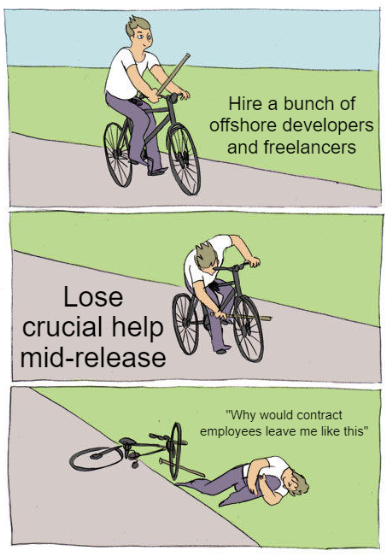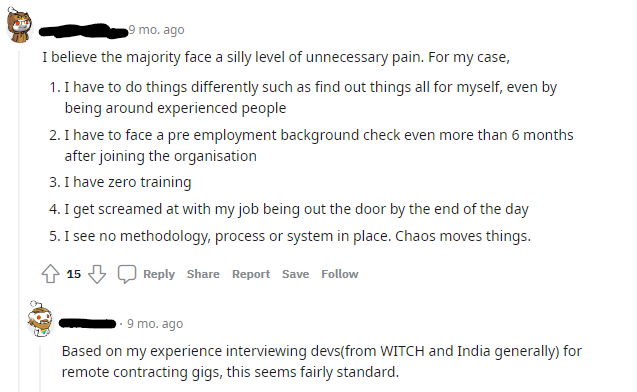Since we wrote about the recruiting challenges 2022 is throwing at the tech industry, we’ve seen former darling growth startups enact massive layoffs, established names pressure their employees to quit by mandating a return to the office, and then, when that didn’t work, firing them, and rumors of further hiring freezes to come from enormous companies that have historically recruited aggressively.
But if you’re reading this, you probably aren’t facing the challenges of an enterprise software development company. You’re here because you want tips for hiring a software developer at a startup, and we have good news for you: with the right strategy, big tech’s loss can be small tech’s gain.

With the safety historically offered by larger companies roiling, there’s a historic opportunity for even a new startup to find software developers willing to take the risk associated with working for a startup.
You just need to understand the challenges you’re up against, the qualities you should be looking for, precisely who you’re looking to hire, where to find them, and how to hire them.
Easy.
1. Why is it hard for startups to hire software developers?
Large companies will put the following in-house team behind hiring software developers:
- A sourcer to identify candidates
- A recruitment coordinator to schedule with candidates and all internal stakeholders
- A recruiter to screen, follow up with, and, generally, nurture candidates through being recruited.
Startups that want to hire software developers need to understand what this kind of infrastructure puts them up against and how to replicate it with fewer resources.
Because a dedicated in-house team of recruiters keeps the recruiting cycle short
- The first call between the candidate and the recruiter is booked as soon as they reply to the sourcer’s outreach.
- The recruiter shares that feedback immediately with the hiring manager to decide whether the candidate should speak to the relevant team members.
- The coordinator syncs up all the schedules of those team members and books a panel.
If the panel goes well, an offer goes out. If the offer is accepted, the whole thing takes about two weeks.
Startups can’t afford to lose any time in the process
A startup VP or Director of Engineering who’s pulling double duty on recruiting–to say nothing of a Co-founder or a CTO–is going to be hard-pressed to duplicate a recruiting team’s administrative efficiency while juggling their core responsibilities.
But top tech talent has a notoriously short attention span when it comes to the recruitment process, and even losing two or three days at each step of the process can make the difference between making a hire and not making a hire for a startup.

Make sure everyone on your software development team involved in hiring knows what stage of the interview process they will participate in and have time blocked off on their calendars. They should be on the same page and ready to go at a moment’s notice.
In short, approach hiring a software developer with the same sense of urgency you do product development. At the end of the day, it has the same impact on business outcomes.
It is difficult to provide great candidate experience at every stage
Good sourcers identify qualified candidates and then craft hyper-personalized outreach so they will be interested in your company’s job descriptions.
Good recruiters put their soft skills to work on the first phone screen and between each subsequent call by connecting with the candidate on a human level to sell the role and speak to a mutual fit.
In our experience, non-recruiting professionals habitually undervalue these personal things that fall outside the candidate’s familiarity with the right programming languages and their previous application software development or project management experience.
They often try to rush a software developer through the hiring process if they have the right skills before actually getting to know them as a person.
The candidate then only has to decide between where they got the best offer rather than where they think they will have the best experience.
But as a Co-Founder or CTO at a startup, you need to capitalize on the face time you get with candidates, so you can assess culture fit and sell them on your vision.

You can have a huge leg up on recruiters at larger organizations if you take the time to figure out why a particular candidate should want to join your startup and reference those reasons habitually throughout interviewing.
Don’t just consider if they’re the right software developer for your company; learn why you’re the right tech startup for them and reference it when you get to the offer and hire phase.
2. What is the technical background startups should look for when hiring software developers?
We’ve written another, more general primer on how to find and hire full-stack developers, so for today we’re just going to focus on how to hire a developer for a startup in particular.
Here’s a sample resume of a candidate who has a profile to thrive at a startup:
| Doug Mowers Staff Engineer at Fungible.ai Doug Mowers is a Staff Software Engineer with eight years of experience in full stack development. He received his BS in Computer Science from Carnegie Mellon University. |
| Professional Experience: Staff Engineer at Fungible.ai (Sep 2020-present) – Led migration of legacy JavaScript code base to TypeScript. – Implemented enterprise service architecture by orchestrating Docker containers in Kubernetes. – Managing a team of four developers. Staff Engineer at Stripe (Feb 2020 – Sep 2020) – Responsible for the entire revenue optimization for frontend. – Maintain and improve upon core platform. Senior Engineer at Stripe (2018-2020) – Building backend APIs in Flask – 3rd party authentication integration, various visualization tools as well as app infrastructure Software Engineer at Amazon (2014-2018) |
| Education: Carnegie Mellon – BS in Computer Science (2010-2014) |
| Skills: Python, JavaScript, TypeScript, APIs, Microservices, Docker, Kubernetes, Flask, Django, MongoDB, Apache Spark, C/C++/C# |
Here’s why Doug would be such a great fit for any given startup:
A trajectory towards smaller companies. After starting his career by putting in four years at a big name, Doug moved to a mature but pre-IPO company, and then towards an emergent startup. Given how many software developers do the opposite–they take on the risk of startups early in their career, then move somewhere “safe”–it’s compelling that he’s interested in working on a smaller software development team.

Familiarity with contemporary problem-solving. Doug has designed microservices and led a migration from JavaScript to TypeScript; as a developer using up-to-date design patterns and technologies, he’s likely the right software developer for your startup if you’re designing any kind of web app.
Communication skills. Even if you’re hiring software developers for your startup as individual contributors, Doug’s history of cross-functionality and leading engineers is an asset for the sink-or-swim experience of being on a startup software development team.
3. When should you hire the first developer for your startup?
You should start hiring software developers as soon as you have a minimum viable product that enough people are paying for to show product-market fit.
If you’re developing a B2C mobile app, this might mean you’ve started organically growing your user base. If you’re developing a pricey B2B SaaS product, it might mean that you’ve got a small handful of paying customers.

Either way, look to scale past your founding in-house team as soon as your customer base starts to scale. The pool of engineers willing and able to be engineering hire number one is fairly small, so you want to start searching sooner rather than later.
4. Should you hire outsource, contract, or full-time developers for your startup?
Truthfully, we believe that the plan for hiring experienced developers for a startup should always tend toward hiring full-time in-house developers. But sometimes you need a developer yesterday, so it’s worth considering the pros and cons of outsourcing and working with freelancers who are typically easier to come by.
Benefits of outsourcing software engineers
Cost-effective in the short term. Developers in Eastern Europe, Latin America, and Asia typically can be paid a small fraction of their Western European and North American counterparts.
Potential for one-size-fits-all solutions with large outsourcing firms. If you suddenly find yourself needing a half-dozen developers for custom software development, software development companies like Wipro, Infosys, TCS, Cognizant, and HCL can provide lots of team members on comparatively short notice.
Drawbacks to outsourcing software engineers
Potentially very expensive in the long term. The aforementioned software development outsourcing firms are called the WITCH companies for a reason. The difference between their strongest and their weakest developer is tremendous, and they burn out and churn through employees constantly.
You know you won’t pay much to work with them, but you won’t know what you’re paying for.
Amplifies the problems of remote work. It’s tricky to manage a team spread across just the North American time zones, and it’s tricky to retain geographically unbound employees. These problems do not get better with people twelve rather than three hours away.

Limited reach in Latin America. With that in mind, Latin America has recently emerged as a significant source of talent for a resource-constrained startup environment. But many North American companies have struggled to establish professional networks in these emerging markets like the existing ones in Eastern Europe and Asia.
In fact, that’s why we recently expanded our talent graph into the region.
Benefits of working with freelance software engineers
Easy to identify specialties. Freelancers typically try to find a technical niche to occupy. A portfolio on an Upwork page will often provide much more context than you’ll get if you try to identify passive full-time candidates via LinkedIn profiles.
Potentially lower fully-loaded costs. While you’ll likely pay quite a bit more for an hourly rate for North American freelancers than outsourcing to emerging markets, this rate may still be lower than the cost of paying salary, social security, and Medicare taxes, as well as providing insurance and offering equity for W2 employees.
That said, this is unlikely to be the case for the top freelancers you’d really want working on your core product.
Drawbacks to hiring freelance developers
Lack of buy-in.
You can fire freelancers whenever you want, and they can do the same to you. And given both how hectic startup life can be and how in-demand good developers are, you don’t want to make yourself too dependent upon developers who don’t rely on you for benefits and to whom you don’t provide equity.
Lack of bandwidth.
You can reasonably assume an in-house developer is working only for your startup. But freelancers could be (and often are) juggling contracts with more than one software development company at once. The cognitive load of software development doesn’t lend itself to switching over to entirely different companies midday.

Benefits of hiring software developers full-time
Higher cross-functionality.
Full-time employees will naturally end up spending more time with project managers, designers, and other members from other teams than someone who’s already part of a team at an outsourcing software development company or freelancers who are only with you a few days a week.
This is crucial for a startup where everyone needs greater awareness of the bigger picture than at larger software development companies.
Better potential to grow in your company.
You aren’t going to train someone you’re contracting with, so they basically need to have all the right technical skills right out of the box. Unless you hire full-time developers for your startup, you’ll miss out on many developers who are 100% up to the job but only know 90% of your particular tech stack.
Cons of bringing on full-time developers
Resource intensity. We’ve already talked about what you’re up against as far as recruiting infrastructure when it comes to hiring programmers for your startup.
But we’d emphasize further how resource-intensive it is to find developers for a startup, never mind everything that goes into running their interviews and selling them on the opportunity.
That’s where we believe artificial intelligence is changing the hiring process, and why we’ve developed a solution for that problem in particular.

A solution like Celential’s frees your team from the high-volume, repetitive tasks that go into managing a recruiting pipeline, ensuring that you don’t need to divert crucial engineering resources toward expanding your developer team.
5. Where do you find developers for your startup?
Job boards and social media
We’d consider these the same thing for two reasons. For one, LinkedIn is both the biggest job board and the biggest professional social media network in the world.
And for another, they share the fundamental misalignment for hiring developers: developers don’t need them to find a job. According to Stack Overflow’s most recent developer survey, only 2.99% of American developers are unemployed and looking for work.
It’s a seller’s market for talented developers, so any strategy depending on developers coming to you will only tap a small part of the pool for tech talent.
Offshore consulting firms
We mentioned this one above, but it’s worth reiterating: large consulting firms will help you find entire teams of software developers quickly, but they expose your company to a host of logistical headaches.
While it may be attractive to pay about 30% for the hourly rate for a developer in the Asia Pacific region rather than North America, offshore consulting firms are something of a black box.
Typically your team will be managed by a project manager on the firm’s side, and you’ll often have very little ability to forecast when a software engineer on your software development project will unexpectedly leave. You’ll be assigned new developers coming in with no context.

Given how timely startup development is, this risk is typically more than it’s worth.
Freelance software developer platforms
We’ll go into a couple of specific examples of freelance platforms in the next section.
In the abstract, we’d just mention that they help you narrow your search by things like price per hour and fine-tune the technical skills you’re looking for, but freelance help is unlikely to represent a long-term fix for your hiring needs.
You can consider these platforms the midway point between the black box of an offshore firm and a full-time developer whom you’ve fully vetted.
The median hourly rate on these platforms is about double the cost of an offshore firm, and you’ll get to work with your freelancers more directly, but you’re still exposed to the risk of them departing suddenly.
External agency recruiters
Full-cycle, external recruiters that know how to hire developers are a great way to grow your team, particularly since they bring the soft communication skills that a new startup will need to get candidates on board with the opportunity.
But they’re the other end of the compromise between finding someone reliable and finding someone for cheap; expect to pay around 25%-30% of a hired candidate’s salary per developer, and expect that cost to add up fast.
Automated recruiting solutions
The time cost that determines the value of a recruiter’s fee–in Celential’s case, the time it takes to identify quality candidates–can be reduced significantly by automating repetitive tasks, permitting human oversight into an AI solution like ours to function much more efficiently.
We argue that when it comes to AI recruiting versus staffing agencies, AI recruiting is typically about 20% cheaper and faster.
6. What are the best websites to hire startup developers from?
Upwork. It’s a freelance platform that allows candidates new and experienced alike to compete for software development jobs, so expect to have to sift a little bit to hire developers up to the technical bar a startup demands.
Toptal. Only more seasoned freelance developers will show up on Toptal. It’s definitely a faster way to search for candidates with the right skills than Upwork, but you can expect that search to return more expensive hourly rates too.
Angellist (Angel.co). Half of the battle in hiring a developer full-time for your startup involves finding people willing to work at a startup. Angellist solves this problem by being the platform for people seeking startup jobs.
That said, it comes with the same challenges as other job boards: almost none of the best developers for startups have cause to use it.
GitHub and Stack Overflow. You might not expect to hire developers for your startup from these sites, but we’ve written at length regarding how to source candidates on Stack Overflow and sourcing on GitHub.
7. What recruiting steps should you take to hire a developer?
We opened with some tips on hiring software engineers that are worth repeating: your startup needs to replicate the speed and the personalized touch that larger organizations use to hire developers at scale. Here are some of the further nuances that go into that replication:
1. Be thoughtful in your cold outreach
- Don’t reach out to developers with the same “exciting opportunities” they’re pitched constantly. Take the time to explain how your startup fits into their career trajectory and aligns with their interests.
- Mention mutual connections and shared history via education or previous jobs.
- Follow up two to three times two to three days apart–and no more.
2. Determine your minimum hiring process
- In addition to keeping on top of scheduling on your end, keep the number of hoops for candidates to jump through on their end to a minimum. Don’t ask for a bunch of information before the first call–salary expectations, immigration status, willingness to work onsite–unless you’re willing to accept a significant dropoff in your cold outreach.
- While there should be a technical, problem-solving component to interviewing a developer for your startup, the technical component to your interviewing shouldn’t take more than a couple of hours total.
- Assigning lengthy take-home assignments is disrespectful of candidates’ time.
- Holding long, gauntlet-style technical panels can actually misrepresent otherwise qualified applicants who are simply exhausted by the fourth consecutive whiteboarding interview.

3. Be transparent
- Layout the whole hiring process your startup uses from the first call. So long as you’re running with minimum hoop-jumping, developers will want to move forward with a startup that has its act together.
- Be largely transparent about salary, but keep some extra equity in your back pocket for truly exceptional candidates.
4. Do your research on the value of your equity
- Most well-funded startups can compete with all but the largest names for base salary. Historically, the issue with competing with established names has been that startup equity is much more volatile than equity in a blue-chip company.
- This has changed recently, and startups have a much better chance to hire developers with the potential of future equity value.
- That said, you need to be able to make a strong case for the projections of your startup equity’s future value–find a couple of big names to benchmark it against based on your company’s growth to this point. We’re not saying you need to crunch your startup’s Sharpe ratio to hire developers, but we are saying you need to be able to make a case for your company’s risk-adjusted return.
Wrapping up
Fast, cheap, good–you’ll want all three when you hire a software engineer, and startups lacking major recruiting infrastructure will need to navigate the compromise between them.
You can use cheaper freelancing platforms and outsourced software development services to find a developer or even a software development team for cheap. Still, you’ll get out in product what you put in with pay.
Developers on higher-end freelancing platforms could end up costing you more in the long run than a well-fitted permanent hire, and recruiting agencies are too expensive for startups over the course of many hires.
AI recruiting solutions are quickly emerging as the best way to identify high-quality candidates quickly with a total cost markedly lower than traditional agencies.
And with Celential’s new use-based model, we ensure that you’ll only pay for the candidates that you actually agree are worth speaking to.
Table of Contents
































